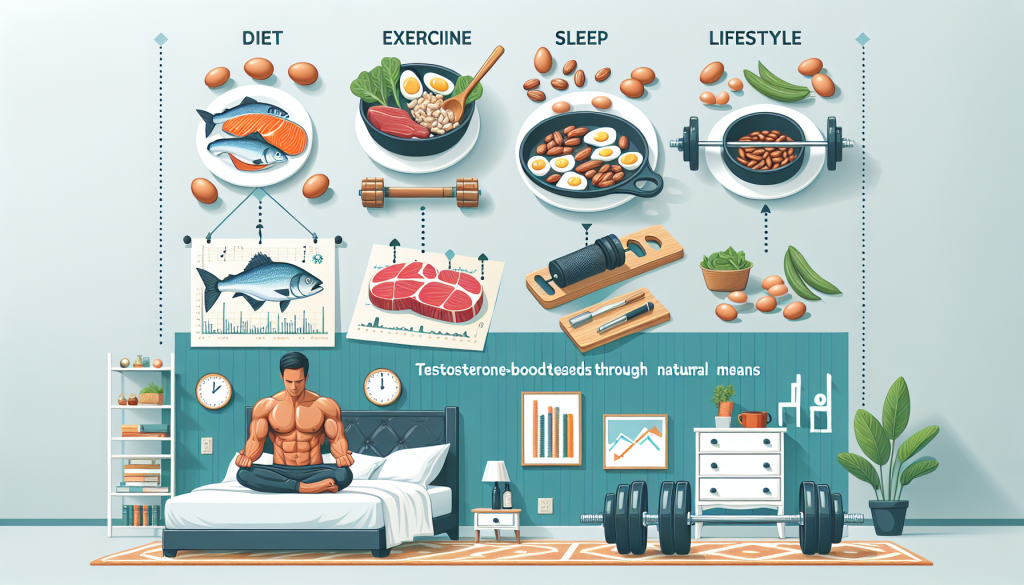Ad Blocker Detected
Our website is made possible by displaying online advertisements to our visitors. Please consider supporting us by disabling your ad blocker.
Boosting testosterone levels naturally is a topic that interests many individuals, as the benefits of healthy testosterone levels extend beyond just increased muscle mass and improved athletic performance. From enhancing energy levels and mood to promoting overall well-being, having optimal testosterone levels is crucial for both men and women. In this article, you will discover some effective strategies and lifestyle changes that can naturally help you elevate your testosterone levels to new heights, allowing you to reach your full potential and thrive in all aspects of life. So, why settle for anything less when you can unlock the power of your own body and achieve the peak testosterone levels you deserve?

This image is property of images.unsplash.com.
Exercise and Physical Activity
Resistance Training
Resistance training, also known as strength training or weightlifting, involves using resistance to challenge your muscles and stimulate growth. This type of exercise is a great way to naturally boost testosterone levels. When you engage in resistance training, your body releases more testosterone to help with muscle recovery and growth. Aim to incorporate exercises that target multiple muscle groups, such as squats, deadlifts, and bench presses, into your routine. Remember to start with lighter weights and gradually increase the load as you build strength.
High-Intensity Interval Training
High-intensity interval training (HIIT) is an effective way to raise testosterone levels naturally. This type of exercise involves short bursts of intense activity followed by brief periods of rest or lower intensity exercise. HIIT workouts can be done in a variety of ways, including running, cycling, or using bodyweight exercises. Not only does HIIT increase testosterone, but it also helps burn fat and improve cardiovascular health. Incorporate HIIT into your exercise routine a few times a week for optimal results.
Compound Exercises
Compound exercises are movements that involve multiple joints and muscle groups. These exercises are highly effective for boosting testosterone levels because they recruit a large amount of muscle mass and stimulate the release of testosterone. Examples of compound exercises include squats, deadlifts, bench presses, overhead presses, and rows. Incorporating compound exercises into your workout routine will provide maximum benefit in terms of testosterone production and overall muscle growth.
Optimal Exercise Duration and Frequency
The duration and frequency of your exercise routine can also have an impact on testosterone levels. While it’s important to challenge your body with regular exercise, it’s equally important to allow for adequate rest and recovery. Aim for at least 150 minutes of moderate-intensity exercise or 75 minutes of vigorous exercise per week, spread out over several days. This ensures that you are giving your body enough time to recover and maximize testosterone production. Additionally, avoid excessive exercise that can lead to overtraining, which may negatively affect hormone levels.
Diet and Nutrition
Consume Healthy Fats
Including healthy fats in your diet is crucial for natural testosterone production. Healthy fats, such as those found in avocados, nuts, seeds, and fatty fish like salmon, provide the building blocks for hormone production. They are also beneficial for overall health and can help reduce inflammation in the body. Aim to include a variety of healthy fats in your diet to support optimal testosterone levels.
Include Protein-Rich Foods
Protein is an essential macronutrient that plays a vital role in testosterone synthesis. Including protein-rich foods in your diet, such as lean meats, poultry, fish, eggs, and dairy products, can help support testosterone production. Additionally, protein aids in muscle repair and growth, which is important for maintaining a healthy testosterone balance. Aim to consume protein with every meal and snack to ensure you’re meeting your body’s needs.
Eat More Zinc
Zinc is a key mineral that is involved in testosterone production. Including zinc-rich foods in your diet can help support healthy testosterone levels. Foods high in zinc include oysters, beef, poultry, pumpkin seeds, and spinach. If you’re concerned about your zinc intake, consider adding a zinc supplement to your daily routine. However, it’s important to consult with a healthcare professional before starting any new supplementation.
Increase Vitamin D Intake
Vitamin D is a crucial nutrient for overall health and plays a role in testosterone production. Spending time in the sun can help your body naturally produce vitamin D, but it can be challenging to get enough sunlight, especially during the winter months or for those living in areas with limited sun exposure. To ensure you’re meeting your vitamin D needs, consider adding a vitamin D supplement to your routine. Remember to consult with a healthcare professional to determine the appropriate dosage for you.
Reduce Sugar and Processed Foods
A diet high in sugar and processed foods can negatively impact testosterone levels. Excessive sugar consumption can lead to insulin resistance, which can disrupt hormone production. Processed foods often contain unhealthy trans fats and artificial ingredients that can interfere with testosterone synthesis. Opt for a diet rich in whole, unprocessed foods, including fruits, vegetables, lean proteins, and whole grains, to support optimal testosterone levels.
Consider Intermittent Fasting
Intermittent fasting is an eating pattern that involves cycling between periods of fasting and eating. This practice has been shown to have positive effects on testosterone levels. Fasting for 16-18 hours and eating within a restricted window of 6-8 hours can help improve insulin sensitivity, reduce body fat, and increase testosterone levels. However, it’s important to listen to your body and consult with a healthcare professional before starting intermittent fasting, especially if you have any underlying health conditions.

This image is property of images.unsplash.com.
Manage Stress Levels
Practice Stress-Reducing Techniques
Chronic stress can have a negative impact on testosterone levels. By implementing stress-reducing techniques into your daily routine, you can help optimize your testosterone production. Some effective stress-reducing techniques include deep breathing exercises, meditation, yoga, and engaging in hobbies or activities that you enjoy. Find what works best for you and make it a priority to incorporate stress reduction into your daily life.
Get Sufficient Sleep
Adequate sleep is crucial for hormone regulation, including testosterone. Lack of sleep or poor-quality sleep can disrupt the balance of hormones in the body, including testosterone. Aim for 7-9 hours of uninterrupted sleep each night to support optimal testosterone levels. Establish a consistent sleep schedule, create a relaxing bedtime routine, and optimize your sleep environment to ensure a restful night’s sleep.
Engage in Relaxation Activities
Engaging in relaxation activities can help reduce stress and support healthy testosterone levels. Activities such as reading, listening to music, spending time in nature, or taking a warm bath can promote relaxation and help balance hormone production. Find activities that bring you joy and make it a habit to incorporate them into your daily routine.
Maintain a Healthy Weight
Lose Excess Body Fat
Maintaining a healthy weight is important for overall health and can positively impact testosterone levels. Excess body fat, especially around the abdomen, can increase estrogen levels and lower testosterone levels. If you’re carrying excess weight, incorporating a combination of regular exercise, a healthy diet, and lifestyle changes can help you achieve and maintain a healthy weight and support optimal testosterone production.
Avoid Crash Diets and Extreme Caloric Deprivation
While it may be tempting to try crash diets or extreme caloric deprivation to lose weight quickly, these approaches can negatively impact testosterone levels. Severe calorie restriction can signal the body to conserve energy and reduce testosterone production. Instead, focus on creating a sustainable and balanced eating plan that includes a variety of nutrient-dense foods. Gradual weight loss achieved through a healthy lifestyle is more likely to support long-term hormone balance.

This image is property of images.unsplash.com.
Optimize Vitamin and Mineral Levels
Ensure Sufficient Vitamin C Intake
Vitamin C is an important antioxidant that plays a role in testosterone production. Including vitamin C-rich foods in your diet, such as citrus fruits, berries, bell peppers, and dark leafy greens, can help support optimal testosterone levels. Additionally, vitamin C aids in collagen production and immune function. If you have difficulty meeting your vitamin C needs through diet alone, consider adding a vitamin C supplement to your routine.
Increase Magnesium Consumption
Magnesium is a mineral that is involved in over 300 biochemical reactions in the body, including testosterone synthesis. Consuming magnesium-rich foods, such as spinach, almonds, avocados, and legumes, can help support healthy testosterone levels. If your diet is lacking in magnesium, you may consider taking a magnesium supplement. However, it’s important to consult with a healthcare professional before starting any new supplementation.
Monitor Vitamin B Levels
The B vitamins, including B6, B12, and folate, play a role in testosterone metabolism. Ensuring sufficient intake of these vitamins can help support healthy testosterone levels. Foods rich in B vitamins include lean meats, poultry, fish, eggs, dairy products, leafy greens, and whole grains. If you have concerns about your vitamin B levels, consider incorporating a B complex supplement into your routine after consulting with a healthcare professional.
Sunshine and Vitamin D
Expose Yourself to Sunlight
Sunlight exposure is a natural way to boost vitamin D levels in the body. Spending time outdoors and allowing your skin to be exposed to sunlight can help support healthy testosterone production. Aim for 10-30 minutes of sunlight exposure on your bare skin each day, preferably during the morning or late afternoon when the sun is less intense. Remember to protect your skin from excessive sun exposure by wearing sunscreen after the initial sun exposure period.
Consider Vitamin D Supplements
If getting sufficient sunlight is challenging, especially during the winter months or for those living in areas with limited sun exposure, consider adding a vitamin D supplement to your routine. Vitamin D supplements can help ensure you’re meeting your body’s needs and support healthy testosterone levels. Consult with a healthcare professional to determine the appropriate dosage for you, as individual needs may vary.

Reduce Alcohol Consumption
Limit Alcohol Intake
While enjoying an occasional drink in moderation is unlikely to negatively impact testosterone levels, excessive alcohol consumption can have detrimental effects. Alcohol can disrupt hormone production and lead to decreased testosterone levels. To support healthy testosterone levels, it’s important to limit alcohol intake. Follow recommended guidelines for moderate alcohol consumption, which typically means up to one drink per day for women and up to two drinks per day for men.
Avoid Chronic Heavy Drinking
Chronic heavy drinking can have serious consequences for overall health and testosterone production. Consider seeking help if you believe you may have a drinking problem. Reducing or eliminating alcohol consumption can have numerous benefits, including supporting healthy hormone production. Focus on implementing strategies to decrease alcohol consumption and prioritize a healthy lifestyle.
Minimize Exposure to Endocrine Disruptors
Avoid Plastic Containers and Bottles
Certain plastic containers and bottles contain chemicals known as endocrine disruptors, which can interfere with hormone production, including testosterone. To minimize exposure to these chemicals, opt for glass or stainless steel containers and bottles whenever possible. Additionally, avoid microwaving food or beverages in plastic containers, as heat can cause the release of harmful chemicals.
Choose Organic and Hormone-Free Products
Many conventional food products, such as fruits, vegetables, meats, and dairy, can contain hormones or pesticides that can disrupt hormone balance. To minimize exposure to these substances, choose organic and hormone-free products whenever possible. Organic foods are grown without synthetic pesticides or fertilizers, and hormone-free animal products are sourced from animals not treated with hormones.
Use Natural Cleaning and Personal Care Products
Common cleaning and personal care products often contain chemicals that can act as endocrine disruptors. To minimize exposure to these chemicals, consider switching to natural cleaning and personal care products. Look for products that are labeled as “green,” “natural,” or “organic.” Additionally, be mindful of the ingredients used in these products and avoid those that contain phthalates, parabens, and synthetic fragrances.
Stay Hydrated
Drink Enough Water throughout the Day
Staying hydrated is important for overall health and can also help support optimal hormone production, including testosterone. Dehydration can negatively impact testosterone levels, so it’s important to drink enough water throughout the day. Aim for at least 8 cups (64 ounces) of water per day, but individual needs may vary depending on factors such as activity level and climate. Remember to listen to your body and drink water when you’re thirsty.
Can Natural Methods Really Boost Testosterone Levels?
Many experts claim that natural testosterone level boosters, such as exercise and proper diet, can significantly increase hormone production. However, scientific evidence supporting their effectiveness is still limited. It’s important to consult a healthcare professional before implementing any new methods to boost testosterone levels.
Limit Stressful Situations
Take Breaks and Time Off
Chronic stress can have a negative impact on testosterone levels. To manage stress effectively, it’s important to take regular breaks and time off when needed. Incorporate short breaks throughout your day to engage in activities that help you recharge and relax. Additionally, prioritize vacations or extended periods of time off to fully disconnect from work and other stressors.
Set Realistic Goals and Prioritize Tasks
Avoid overwhelming yourself with an excessive amount of tasks or unrealistic goals. Setting realistic goals and prioritizing tasks can help reduce stress and optimize testosterone levels. Break larger tasks into smaller, manageable steps and focus on one task at a time. Practice effective time management techniques, such as creating to-do lists or using a planner, to help you stay organized and decrease stress.
In conclusion, there are various natural ways to boost testosterone levels. Through regular exercise, a healthy diet, stress management, maintaining a healthy weight, optimizing vitamin and mineral levels, getting enough sunlight, reducing alcohol consumption, minimizing exposure to endocrine disruptors, staying hydrated, and limiting stressful situations, you can support healthy testosterone production. Remember, individual factors may influence the effectiveness of these strategies, so it’s important to listen to your body and consult with a healthcare professional for personalized advice. By making these lifestyle changes, you can enhance your overall well-being and promote optimal testosterone levels naturally.



